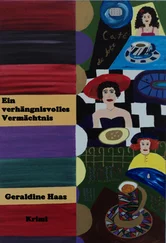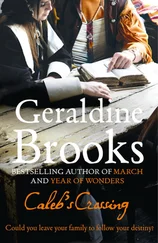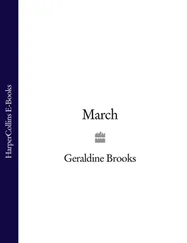She leaned forwards to stir some leaves steeping in a big black kettle near the fire. ‘His intentions to you were otherwise. If that’s what’s worrying you, set your mind easy. He wanted you to wife, Anna Frith, and I told him he’d do well with you, if he could talk you round to it. For I see that you’ve changed somewhat since Sam Frith passed. I think you like to go and come without a man’s say-so. I told him your boys were his best chance to win you. For, unlike me, you have them to look to, so you can never live just for yourself.’
I tried to imagine the two of them lying together discussing such things. ‘But why,’ I blurted, ‘if you were on such terms, did you not marry him yourself?’
‘Oh, Anna, Anna!’ She shook her head at me and smiled as one does at a slow-witted child. I felt my colour rise. I was confounded as to what I had said that had amused her so. She must have sensed my vexation, for she stopped smiling, took the cup from my hand, and looked at me with seriousness.
‘Why would I marry? I’m not made to be any man’s chattel. I have my work, which I love. I have my home – it is not much, I grant, yet sufficient for my shelter. But more than these, I have something very few women can claim: my freedom. I will not lightly surrender it. And besides,’ she said, shooting me a sly sideways glance from under her long lashes, ‘sometimes a woman needs a draught of nettle beer to wake her up, and sometimes she needs a dish of valerian tea to calm her down. Why cultivate a garden with only one plant in it?’
I smiled hesitantly, as if to show that I could see the jest, for it fell into my heart that I wanted her good opinion and would not have her think me a dim and simple girl. She rose then to be about her work, and so I left her, more confused than when I’d arrived. She was a rare creature, Anys Gowdie, and I had to own that I admired her for listening to her own heart rather than having her life ruled by others’ conventions. I, meanwhile, was on my way to be ruled for the afternoon by people I loathed. I trudged on towards Bradford Hall, passing through the edge of the Riley woods. The sun was bright that day, and strong shadows from the trees fell in bands across the path. Dark and light, dark and light, dark and light. That was how I had been taught to view the world. The Puritans who had ministered to us here had held that all actions and thoughts could be only one of two natures: godly and right, or Satanic and evil. But Anys Gowdie confounded such thinking. There was no doubt that she did good: in many ways, the well-being of our village rested more on her works, and those of her aunt, than on the works of the rectory’s occupant. And yet her fornication and her blasphemy branded her a sinner in the reckoning of our religion.
I was still puzzling over this as I reached the wood’s abrupt edge and began skirting the golden fields of the Riley farm. They had been all day scything there – twenty men for twenty acres. The Hancocks, who farmed the Riley land, had six strong sons of their own and so needed far less help than others at their harvest. Mrs. Hancock and her daughters-in-law wearily followed behind their husbands, tying up the last of the loose stalks into sheaves burnished by the sunlight. I saw them that afternoon through Anys’s eyes: shackled to their menfolk as surely as the plough-horse to the shares.
Lib Hancock, the eldest brother’s wife, had been a friend to me since childhood, and as she straightened for a moment to ease her back, she raised a hand to shade her eyes and perceived that it was I, walking at the field’s edge. She waved to me, then turned for a word to her mother-in-law before leaving her work and crossing the field towards me.
‘Sit with me for a short while, Anna!’ she called. ‘For I am in need of a rest.’
I was in no hurry to get to the Bradfords’, so I walked with her to a grassy bank. She dropped down on it gratefully and closed her eyes for a moment. I rubbed at her shoulders and she purred with the ease my kneading hands brought her.
‘A sorry business about your lodger,’ she said. ‘He seemed a good man.’
‘He was that,’ I said. ‘He was uncommonly kind to my boys.’ Lib tilted her head back and gave me an odd look. ‘And to me, of course,’ I added. ‘As to everyone.’
‘I believe my mother-in-law had him in mind for Nell,’ she said. Nell, the only girl in the Hancock family, was so strictly kept by her many brothers that we often jested that she’d never get wedded, since no man could venture near enough to see what she looked like. Knowing what I now knew of Mr. Viccars, I laughed despite my sadness.
‘Was any woman in this village not considering the bedding of that man?’
I have said that Lib and I were close – we had ever exchanged girlish confidences. It was this habit, I suppose, that led me into the account I made her then, a bawdy confession of my own lust, which I had the right to confide to her, and then that which I did not: the news I’d just learned of Anys’s sport with my lodger.
‘Now, Lib,’ I said at last, rising reluctantly to continue on my way, ‘mind you do not prate my news all around the Hancock house this night.’
She laughed at that, and pushed me playfully on the shoulder. ‘Oh, and as if I’d be talking of tumblings in front of Mother Hancock and that houseful of men! You’ve got a peculiar view of our household, you have. The only mating fit for remark at the Hancock table is when the tups get put to the ewes!’ We both laughed then, kissed each other, and parted to our diverse toils.
At the edge of the field, the hedgerows were deep green in their glossy leaves and the blackberries beginning to plump and redden. Fat lambs, their fleeces gilded by sunlight, grazed in lush grasses. But for all its loveliness, the last half mile of this walk was always unpleasant to me, even when I wasn’t so fatigued. I disliked all of the Bradford family, and I especially feared the colonel. And I misliked myself for giving way to that fear.
Colonel Henry Bradford was said by all to have been an intelligent soldier who had led his men with uncommon valour. Perhaps his military success had made him arrogant, or perhaps such a man should never have retired to the quiet life of a country gentleman. In any case, there was no sign of wise leadership in the way he conducted his household. He seemed to take a perverse amusement in belittling his wife. She was the daughter of a wealthy but ill-connected family, a vapid beauty whose looks had stirred a brief infatuation in the colonel that lasted just until he pocketed her marriage portion. Since then, he had never let pass an opportunity to disparage her connections or slight her understanding. She, though still quite beautiful, had become brittle after long years of such treatment. Cowed and nervous, she fretted constantly over where next her husband would find fault, and so kept her staff on constant edge, always reordering the household routine so that the simplest tasks became effortful. The Bradfords’ son was a rake-shamed, drunken fanfarroon who fortunately stayed mostly in London. On the rare occasions he was at the Hall, I tried to find excuses for declining work there, and when I could not afford to do so, endeavoured to stay out of his line of sight and made sure I could never be entrapped into being alone with him. Miss Bradford was, as I have said, a proud and sour young woman, whose only glimmer of goodness seemed to come from a real solicitude for her unhappy mother. When her father was away, she seemed able to quiet her mother’s nerves and soothe her fretfulness, and one could work there without fear of tirades. But when the colonel returned, everyone, from Mrs. Bradford and her daughter down to the lowliest scullery maid, tensed like a cur waiting for the boot.
Читать дальше












